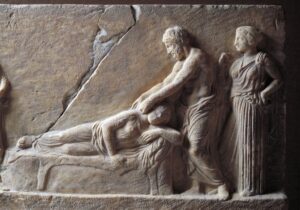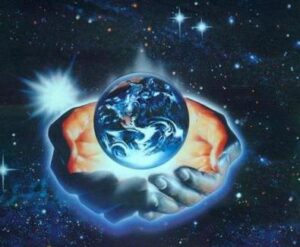 The Third Force archetype that represents conscious partnership between the Lover and Beloved is the Healer. Healers are strong enough to address their own pain and the pain of others without trying to ignore it or escape. Their love can be tough. They can confront and forgive others without becoming victims or seeking revenge. They understand how to use love’s energy, conserve their own by not giving too much, and respect the energy of others by not taking too much.
The Third Force archetype that represents conscious partnership between the Lover and Beloved is the Healer. Healers are strong enough to address their own pain and the pain of others without trying to ignore it or escape. Their love can be tough. They can confront and forgive others without becoming victims or seeking revenge. They understand how to use love’s energy, conserve their own by not giving too much, and respect the energy of others by not taking too much.
The love of the Healer is a great and mysterious paradox. One part (we can think of it as the drive for species-preservation) gives out love—a great, powerful surging of caring and compassion—freely and unconditionally. Yet, knowing that the gift can easily be refused, and recognizing the need to protect his or her own energies, the Healer keeps another part (the drive for self-preservation) to her- or himself, remaining unattached to the outcome. Thus the Healer’s heart is open, free-flowing, joyful, and generous at the same time that it is calm, objective, balanced, and detached.
This is not an easy condition to attain. Indeed, it is usually found only in those who have been initiated into their proper relationship with the Self through an experience of suffering for the sake of love and then been healed by it. Because Healers know they are totally loved, they can love totally; having been healed by love, they can heal with love. This is what is meant by the term, “wounded healer.” Their healing can be physical, social, mental, emotional, or spiritual. Or it can be all of these at once.
Authentic Healers do not heal to satisfy their egos or impress others. They do not make elaborate plans to heal, nor do they strain and struggle to make it happen. Their healing is rarely obvious and never flashy. They simply go about their business of being emotionally present to others without worrying about the past moment or planning for the next. Simply by caring and being real, by listening with understanding hearts, forgiving thoughts and generous spirits, by responding to all with interest and compassion, they attract the wounded and bless them gently, subtly, spontaneously, just by being themselves. Authentic Healers heal because they feel. Because they care. Because they love.
When love is the only rule, there is no need for other rules. For instance, Healers are not interested in your religious beliefs as long as your thoughts, words, and actions come from authentic compassion and love. They have no need to legislate your sexuality, to confine it to relationships between particular kinds of people who have received certain kinds of sanctions via specified rituals, as long as you never use sex to cause pain.
 For Authentic Healers, religions and sexual practices are not sources of status or self-esteem, bids for acceptance, ways to escape suffering, or means to acquire power over others. They are simply ways to connect with and express our love: for the Self, for the Other, for the miracle of Life. This love doesn’t come easy. You have to want it with all your heart, ask for it, and be willing to work for it by examining your motives and refusing to act on those that are self-serving.
For Authentic Healers, religions and sexual practices are not sources of status or self-esteem, bids for acceptance, ways to escape suffering, or means to acquire power over others. They are simply ways to connect with and express our love: for the Self, for the Other, for the miracle of Life. This love doesn’t come easy. You have to want it with all your heart, ask for it, and be willing to work for it by examining your motives and refusing to act on those that are self-serving.
When do you withdraw love from yourself and your Beloved? What secret fear and pain prevents you from giving it? What are you prepared to do to become a Healer?
You can find out more about the Lover and Beloved in The Wilbur Award-winning Healing the Sacred Divide at Amazon and Larson Publications.com and in Jean’s new Nautilus Award-winning The Soul’s Twins, at Amazon and Schiffer’s Red Feather Mind, Body, Spirit. Paper and E-book versions of The Bridge to Wholeness and Dream Theatres of the Soul are at Amazon. Subscribe to her newsletter at www.jeanbenedictraffa.com.




11 Responses
Nice!
Thanks, Skip.
The connection between helping others find healing and acknowledging my own wounding has always impressed itself on me. Great blog entry, clear, concise, and insigthfull….
Yes, it’s always a balance, isn’t it? Thank you for stopping by, Jamie.
“They (Healers) simply go about their business of being emotionally present to others without worrying about the past moment or planning for the next.” This line jumped out at me. Moment to moment emotional presence to the the Self and the other is so easy to lose. I’m practicing to increase my awareness, but it is oh so easy to forget.
It is difficult to do and easy to forget, Tallulah. I’m practicing too. Hopefully, the more we practice, the more it will become a habit.
Jeanie,
One of the most powerful things you do in the book and blog is the question/questions you ask with the archetypal description. I have worked with them over and over again and again. They just take me layer by layer deeper into myself. I love speaking inwardly (voice dialogue) with these beloved parts of myself. Wow do mine like attention and usually have plenty to say. Express and listen…nice job! Thanks!
Thanks, Ann. I love your deep commitment to doing the work. Thanks for sharing your process here. Speaking inwardly (talking to my other selves in an inner active imagination) is a favorite technique of mine too! And thank you for your kind comment. It really helps to know what readers find helpful!
Hello Jean,
This was a wonderfully inspiring post! I have some questions. I want to be a healer. However, I’m also a very ambitious person with a needy tendency to want to be all things to all people. I’m not sure how much of my desire to heal is derived from my ego’s ambition, and how much is derived from actual love and a desire to transcend my own ego for the greater good.
So, how can I tell when my desires come from a non-selfish place? Also, how can I cultivate healer qualities within myself?
Thank you,
Emerald
Hi Emerald,
Thanks for the great questions. When I started to answer them my response got so long that it was turning into a blog post, so that’s how I’m going to use it. My next post will be in honor of election day, so look for your answer in the post after that! Jeanie
An excellent reminder. Thank you. I’m grateful for the healers in my life. Often they’re simply the ones willing to show up to help when someone is in need. They say “Yes!” Sometimes I play that role, but as I get older, I’m sometimes the one calling for help. I’m still trying to get used to this new role.